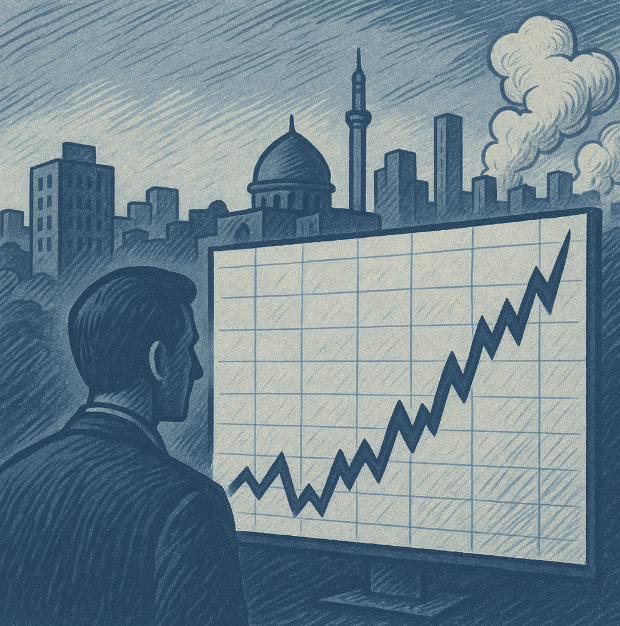| Not a fan of Fred? Unsubscribe here. |
Markets React as Gaza Ceasefire Brings Calm
Ceasefire Boosts Confidence in Global Trade
October 13, 2025
|
| MorningBullets is the fastest way to catch up on the market and political news that matter most to your money. Quick takes, sharp insight, and curated opportunities—served fresh every weekday morning. |
Sponsored Content
Musk’s Quiet AI Build and a $100 AngleAs media fixates on side stories, a massive AI initiative is unfolding quietly. Our research points to a smaller AI outfit that could be a key beneficiary. It’s not public, but there may be a way to participate with a low minimum. See how it works, and why it may not stay under the radar. 📥 Learn How You Could Get InBy clicking this link you agree to receive emails from Behind the Markets and our partners. You can opt out at any time. Privacy Policy. |
 Markets respond to calm: Israeli equities rebound amid ceasefire optimism.
Markets respond to calm: Israeli equities rebound amid ceasefire optimism.
|
Good Morning, Markets are hitting new highs as a Gaza ceasefire sparks a wave of optimism across global equities. Israel’s benchmark index jumped nearly 2%, and oil prices eased as traders priced in lower geopolitical risk. We unpack how this truce is shaping investor sentiment, what it signals for regional stability, and why energy markets may not stay quiet for long.Markets also rebound as Trump tempers his China tariff rhetoric, the U.S. government shutdown extends into a 12th day with looming layoffs, and the Nobel Prize in Economics honors scholars for pioneering research on innovation led growth. Thank you for your feedback. Your responses and today's questions, are below. Here are your Morning Bullets. – Truly yours, Fred Frost |
📉 Friday's Market RecapFriday saw Wall Street take a brutal hit as U.S.-China trade tensions flared with Trump’s 100% tariff threat on Chinese imports, dragging the S&P 500 down 2.71% for its worst day since April. The Dow fell 1.9%, and Nasdaq tumbled 3.6%, fueled by fears of supply chain chaos over rare earth controls. Here’s what moved the needle.
|
📉 Daily Performance Snapshot
|
🔭 What to Watch TodayToday’s docket is packed with events that could sway markets, from policy remarks to economic deadlines amidst ongoing trade and shutdown concerns. Keep your eyes peeled for these developments. |
💡 Opportunity WatchAmid trade spats and policy shifts, a few corners of the market are flashing potential for savvy investors. Here’s where to look.
|
Sponsored Content
Crypto Profit Multiplier, Free ReportNew legislation may accelerate a $3.7 trillion crypto cycle. Our analysis spotlights five lesser known assets we believe could lead the next phase. Get the full thesis and tickers now, instant access, email required. 📥 Access the Report NowBy clicking the link above you agree to receive periodic updates from our sponsor. |
🔥 The Big BulletGaza ceasefire lifts Israeli markets and boosts investor confidenceWhat happened: After Israel and Hamas agreed to a Gaza ceasefire, the Tel Aviv Stock Exchange surged nearly 2%, with the TA-125 index climbing to 3,327 and the TA-35 rising to 3,250. Investors reacted positively to news of de-escalation, signaling reduced geopolitical risk. Confidence strengthened further as fund managers in Israel noted rising inflows into local equities, a stronger shekel, and easing bond yields. The rally followed weeks of uncertainty tied to conflict in Gaza and came amid broader optimism for a stable truce. Why it matters: The ceasefire reduced Israel’s perceived risk premium, encouraging global investors to re-enter its markets. A firmer shekel and lower bond yields suggest improving economic sentiment, potentially easing inflation pressure and funding costs. For long-term investors, this reflects a shift from defensive assets toward equities. The development also has regional implications, global trade routes affected by Middle East tensions could gradually normalize, improving logistics and reducing energy-related volatility. In short, calmer geopolitics may support both Israel’s domestic growth and global market stability. What’s next: Investors will watch how durable the ceasefire proves in the coming weeks. Renewed clashes could quickly reverse market gains and strengthen the dollar again against the shekel. Energy traders are monitoring crude prices closely after oil settled lower following the truce, as traders priced in lower geopolitical risk. Policymakers in Israel may also face calls to capitalize on market calm to attract more foreign investment and stabilize inflation expectations. For now, the balance of peace and profit remains fragile but promising. |
Reader Feedback
Last week, in regards to the U.S. bailing out Argentina, results were very much mixed, with the majority of you at 40% agreeing "It's about politics, not economics"
Jonathan from Idaho wrote in: “This might work for them for now, but not forever. If they don't solve their own problems, they'll just end up in trouble again later.”
Here's what I'm asking you today:
As always if your opinion is not here, or you want to throw your two cents at me, reply to the E-mail, and let me know your exact thoughts.
🧭 Policy & Market Ripples
|
Sponsored Content
How AI Is Reshaping Banking, And What You Can DoFinancial decisions are increasingly being made by machines. Will you still have control over your banking, credit, and financial choices? Our free guide explains what’s changing, and how to stay resilient in the AI age. 📗 Get the Report NowBy following the link above or using any of the links provided below, you're choosing to opt in to receive insightful updates from The Wealthiest Investor plus 2 free bonus subscriptions! Privacy Policy |
Today's Trivia
- A )The amount of taxes a person pays each year
- B) The total amount of money needed to cover basic expenses like housing, food, and transportation
- C) The average income in a specific area
- D) The total amount of expected income based on Government Data, to cover basic expenses like housing, food, and transportation
Last week, 91% of you chose the right answer to the trivia question: The total amount of money needed to cover basic expenses like housing, food, and transportation
|


